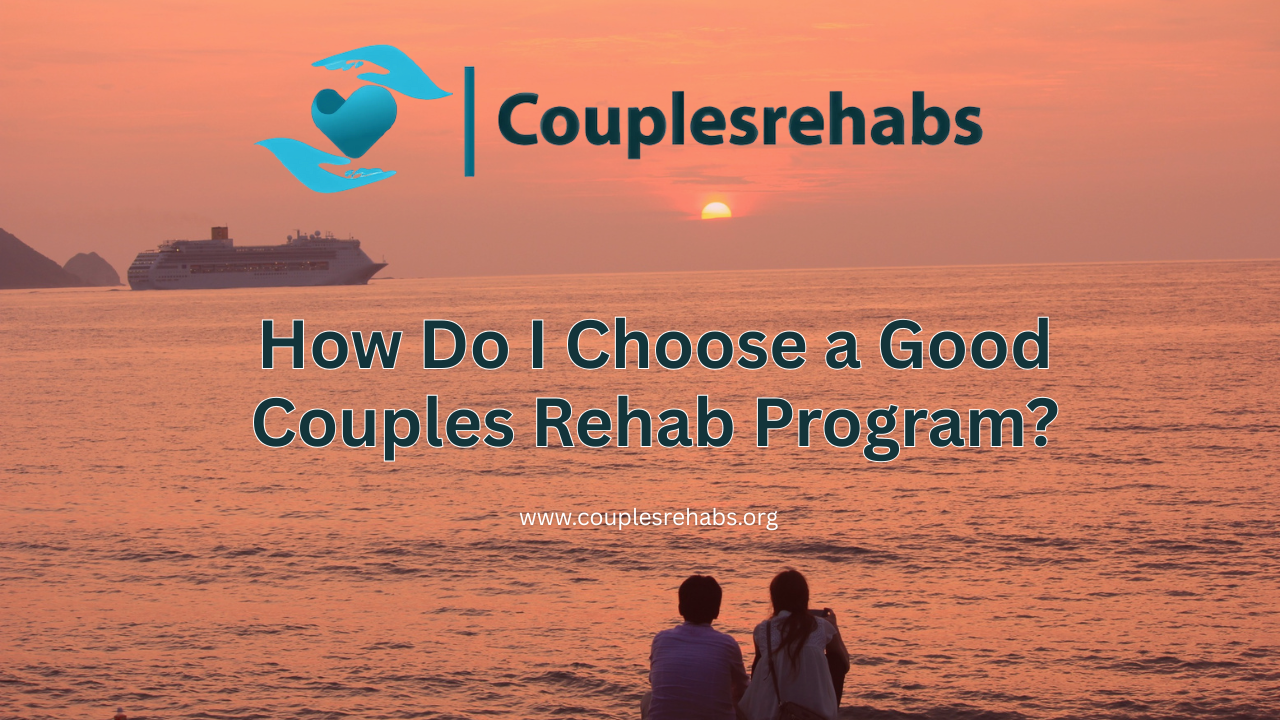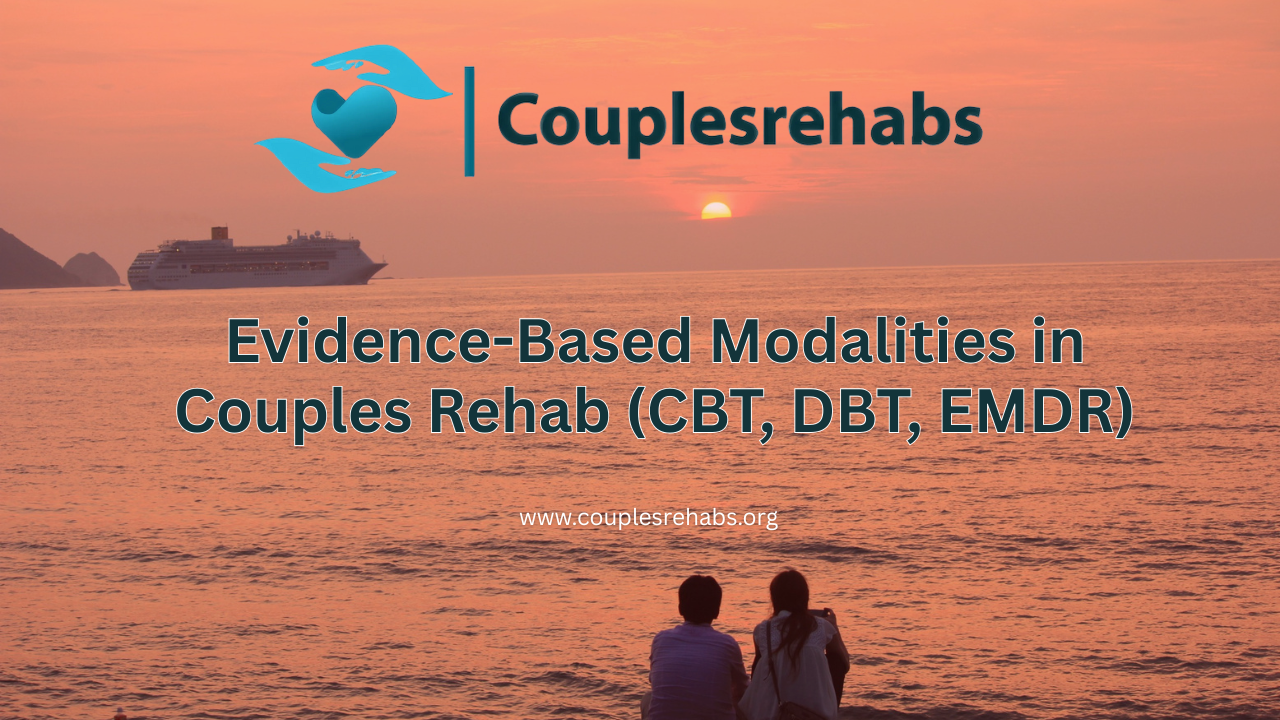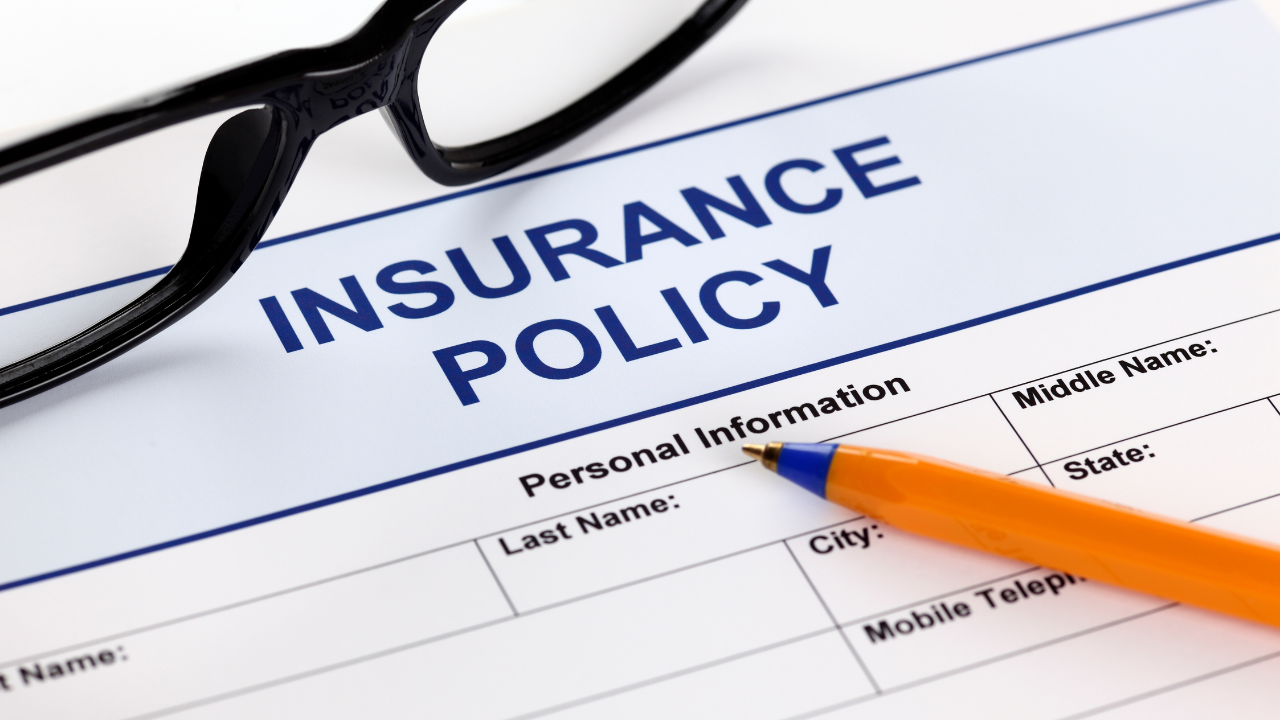How Do I Choose a Good Couples Rehab Program?
Choosing the right couples rehab program can feel overwhelming when you’re facing addiction alongside your partner. Unlike individual treatment, couples addiction treatment program selection criteria involve evaluating how well a program addresses both partners’ individual needs while strengthening the relationship foundation that supports long-term recovery.
When addiction affects a relationship, it creates complex dynamics that require specialized care. Research shows that couples who enter treatment together consistently report greater reductions in substance use than patients who receive individual therapy alone. This makes understanding what criteria should I use to select couples addiction treatment absolutely crucial for your recovery success.
This comprehensive guide will walk you through the essential factors to consider, red flags to avoid, and practical steps to take when selecting a couples rehabilitation program that truly fits your unique situation.
Understanding Couples Addiction Treatment Program Selection Criteria
What Makes Couples Rehab Different from Individual Treatment
Couples addiction treatment addresses both individual substance use disorders and the relationship dynamics that either support or undermine recovery. The most effective programs integrate evidence-based individual addiction treatment with proven couples therapy modalities like Behavioral Couples Therapy (BCT), Cognitive Behavioral Therapy (CBT), and Emotionally Focused Therapy (EFT).
When evaluating how to evaluate couples rehab program selection criteria, you’re essentially looking at three interconnected areas: individual treatment quality, relationship-focused interventions, and the integration between these approaches.
Core Selection Criteria Every Couple Should Consider
Accreditation and Licensing Standards: Quality programs maintain accreditation from respected organizations like CARF International or the Joint Commission. These accreditations ensure the facility meets rigorous standards for addiction treatment and maintains qualified staff with appropriate credentials.
Assessment and Evaluation Process: Look for programs that conduct comprehensive assessments of both partners individually and as a couple. This should include individual addiction and mental health evaluations, relationship dynamics assessment, communication patterns analysis, and trauma screening.
Evidence-Based Treatment Approaches: The best criteria for choosing couples substance abuse treatment centers on programs that use proven therapeutic modalities. BCT has shown particularly strong outcomes, with studies indicating that couples who complete BCT together have significantly lower relapse rates compared to individual treatment alone.
Essential Questions to Ask Couples Rehab Centers Before Enrollment
Treatment Approach and Philosophy Questions
When contacting potential programs, ask specific questions about their treatment philosophy. Do they view addiction as a disease requiring medical intervention, or do they take a more holistic approach? Understanding their underlying beliefs will help you determine if their approach aligns with your values and needs.
Inquire about their experience treating couples specifically. Ask how long they’ve been offering couples programs, what their success rates are, and whether they can provide testimonials or outcome data. A reputable program will be transparent about their results and willing to discuss both successes and challenges.
Staff Qualifications and Experience
What Credentials Do Your Staff Hold? Quality couples rehab programs employ licensed addiction counselors who also hold specialized training in couples and family therapy. Look for staff with credentials from recognized organizations like the American Association for Marriage and Family Therapy (AAMFT) or certified addiction counselors with couples therapy experience.
How Do You Handle Dual Diagnosis? Many individuals struggling with addiction also have co-occurring mental health conditions. Ensure the program has qualified mental health professionals who can address these complex needs alongside addiction treatment.
Program Structure and Duration
Ask about treatment duration options and flexibility. Quality programs offer various levels of care, from intensive outpatient programs (9-12 hours per week) to residential programs (30-90 days) to accommodate different severity levels and life circumstances.
Evaluating Treatment Approaches: Evidence-Based vs. Alternative Methods
Understanding Evidence-Based Couples Treatment
Evidence-based treatment approaches have been scientifically studied and proven effective for couples addiction treatment. Behavioral Couples Therapy (BCT) stands out as particularly effective, with research showing that patients who engage in BCT consistently report greater reductions in substance use than those receiving only individual counseling.
Cognitive Behavioral Therapy (CBT) helps couples identify and change negative thought patterns and behaviors that contribute to substance use. Dialectical Behavior Therapy (DBT) teaches emotional regulation skills that are crucial for maintaining sobriety while navigating relationship challenges.
Emotionally Focused Therapy (EFT) helps couples strengthen their emotional bond and develop secure attachment patterns that support recovery. These approaches work synergistically to address both addiction and relationship healing simultaneously.
Alternative and Complementary Therapies
While evidence-based treatments should form the foundation of any quality program, many effective couples rehab centers also incorporate complementary therapies. These might include art therapy, music therapy, yoga, meditation, or outdoor/adventure therapy.
When evaluating these additional offerings, consider whether they enhance the core treatment program or serve as distractions from essential therapeutic work. The best programs use alternative therapies strategically to support the primary evidence-based interventions.
How to Choose Couples Rehab with Both Partners Addicted
When both partners struggle with substance use disorders, program selection becomes more complex. Look for programs specifically designed for dual-addiction couples that understand the unique challenges this presents. These programs typically include:
- Separate individual therapy sessions for each partner
- Joint couples therapy sessions
- Group therapy with other couples facing similar challenges
- Coordinated treatment planning that addresses both partners’ needs
- Specialized relapse prevention planning for couples
Inpatient vs Outpatient Couples Addiction Treatment Selection Guide
Inpatient Treatment Considerations
When to Choose Inpatient Care: Residential treatment is typically recommended when one or both partners have severe addiction, multiple failed treatment attempts, co-occurring mental health conditions, or unsafe home environments that could trigger relapse.
Inpatient programs provide 24/7 medical supervision, structured environments free from triggers, and intensive therapeutic programming. However, they require taking time away from work and family responsibilities, which may not be feasible for all couples.
Living Arrangements in Inpatient Programs: Most inpatient couples programs provide separate living quarters for each partner, especially during the initial phases of treatment. This allows for individual focus while still participating in couples therapy sessions together.
Outpatient Treatment Benefits
Flexibility and Real-World Application: Outpatient programs allow couples to maintain work and family obligations while receiving treatment. This can be particularly beneficial for couples with children or significant financial responsibilities.
Graduated Levels of Care: Many programs offer step-down approaches, starting with partial hospitalization programs (PHP) that provide intensive daily treatment, then transitioning to intensive outpatient programs (IOP) with evening or weekend sessions.
When Outpatient is Appropriate: Couples with less severe addictions, strong support systems, and stable home environments often succeed in outpatient programs. However, both partners must be committed to recovery and able to resist triggers in their daily environment.
Making the Inpatient vs Outpatient Decision
Consider your individual and relationship circumstances carefully. Factors like addiction severity, previous treatment history, support system strength, and life responsibilities all play crucial roles in determining the most appropriate level of care.
Insurance Coverage for Couples Rehabilitation Programs: What You Need to Know
Understanding Insurance Benefits
Coverage Variations: Insurance coverage for couples rehab programs varies significantly between providers and plans. While most insurance plans cover individual addiction treatment, couples-specific programming may have different coverage levels or require pre-authorization.
In-Network vs. Out-of-Network: Choosing in-network providers significantly reduces out-of-pocket costs. However, if your preferred couples program is out-of-network, some insurers may still provide partial coverage or make exceptions for specialized care.
Financial Planning and Insurance Verification
Pre-Authorization Requirements: Many insurance plans require pre-authorization for addiction treatment. Start this process early, as it can take several weeks and may require documentation from healthcare providers about medical necessity.
Hidden Costs and Payment Options: Beyond basic treatment costs, consider additional expenses like family therapy sessions, extended stays, or specialized therapies. Many quality programs offer payment plans, sliding-scale fees, or scholarship options for those with limited financial resources.
Documentation for Insurance: Keep detailed records of all communications with insurance providers, including reference numbers for calls and copies of all submitted paperwork. This documentation can be crucial if coverage disputes arise.
Maximizing Insurance Benefits
Work with the rehab center’s financial counselors to understand your benefits fully. Many facilities have dedicated staff who specialize in insurance verification and can help navigate complex coverage issues.

Red Flags to Avoid When Choosing Couples Addiction Treatment
Warning Signs of Substandard Programs
Unrealistic Promises and Marketing Red Flags: Be wary of programs that guarantee success, promise “quick fixes,” or claim extremely high success rates without providing verifiable data. Addiction recovery is a complex process, and ethical programs acknowledge both potential benefits and limitations.
Lack of Proper Licensing: Verify that both the facility and individual staff members hold appropriate licenses and certifications. Unlicensed or improperly credentialed providers can provide ineffective or even harmful treatment.
Poor Communication and Transparency: Quality programs are transparent about their methods, costs, and outcomes. Red flags include reluctance to answer questions, pressure to commit immediately, or inability to provide clear information about treatment approaches.
Staff and Program Quality Concerns
High Staff Turnover: Frequent changes in therapeutic staff can disrupt treatment continuity and relationship building, which are crucial for couples therapy success.
One-Size-Fits-All Approaches: Avoid programs that don’t customize treatment plans for individual couples’ needs. Effective couples addiction treatment recognizes that each relationship has unique dynamics and challenges.
Lack of Aftercare Planning: Programs that don’t provide comprehensive aftercare planning or continuing support often have higher relapse rates. Quality programs help couples transition back to their daily lives with ongoing support systems.
Financial and Ethical Red Flags
Be cautious of programs that demand full payment upfront without insurance verification, refuse to provide cost breakdowns, or pressure you into extended treatment without clear medical justification.
Success Rates: How Couples Rehab Compares to Individual Treatment
Research on Couples Treatment Outcomes
Statistical Advantages: Studies consistently show that couples who participate in behavioral couples therapy experience better outcomes than those in individual treatment alone. Research indicates that couples completing BCT together have significantly lower relapse rates, improved relationship satisfaction, and reduced domestic violence incidents.
Long-Term Recovery Success: Couples rehab programs that integrate relationship work with addiction treatment show particularly strong long-term outcomes. The mutual support and accountability that healthy relationships provide create additional motivation for maintaining sobriety.
Factors Affecting Success Rates
Motivation and Commitment: Both partners must be genuinely committed to recovery and willing to participate fully in treatment. Success rates drop significantly when one partner is ambivalent about treatment or participating only under pressure.
Relationship Stability: Couples with fundamentally strong relationships but addiction-related problems typically see better outcomes than those with severe underlying relationship dysfunction.
Individual Factors: Each partner’s addiction severity, mental health status, trauma history, and previous treatment experiences all influence overall success rates.
Measuring Success Beyond Sobriety
Quality couples programs measure success through multiple metrics: sustained sobriety, improved relationship satisfaction, better communication skills, reduced conflict, and enhanced overall life functioning. The best programs provide ongoing follow-up to track these outcomes over time.
Making Your Final Decision: A Step-by-Step Selection Framework
Phase 1: Initial Assessment and Research
Start by honestly assessing both partners’ needs, including addiction severity, mental health concerns, relationship challenges, and practical considerations like insurance coverage and scheduling constraints.
Research potential programs thoroughly, reading reviews from former patients, checking accreditation status, and verifying staff credentials. Create a shortlist of 3-5 programs that meet your basic criteria.
Phase 2: Contact and Evaluation
Scheduled Consultations: Most quality programs offer initial consultations to assess fit and answer questions. Use these opportunities to evaluate the program’s professionalism, transparency, and approach to couples treatment.
Visit Facilities When Possible: If feasible, visit potential programs in person. This gives you a sense of the environment, staff interactions, and overall program culture.
Check References: Ask for and contact references from former patients who completed couples programs. Their perspectives can provide valuable insights into program effectiveness and potential challenges.
Phase 3: Final Decision Making
Compare your options systematically, weighing factors like treatment approach, staff qualifications, success rates, location, cost, and insurance coverage. Consider both partners’ comfort levels and preferences in making the final decision.
Remember that the “best” program is the one that fits your specific needs and circumstances, not necessarily the most expensive or well-known option.
Frequently Asked Questions
Do both partners need to have addiction issues to qualify for couples rehab?
Not necessarily. Many programs accept couples where only one partner has a substance use disorder, recognizing that addiction affects both partners and the relationship system. However, both partners must be committed to recovery and willing to participate fully in the treatment process.
How long do couples rehab programs typically last?
Program duration varies based on addiction severity and individual needs. Intensive outpatient programs typically last 8-12 weeks with 9-20 hours of weekly treatment. Residential programs commonly run 30-90 days, with some extended programs offering 6-12 months of treatment for severe cases.
Can couples stay in the same room during inpatient treatment?
Most inpatient couples programs provide separate living quarters, especially during initial treatment phases. This allows each partner to focus on individual recovery work while participating in couples therapy sessions together. Some programs may allow shared accommodations in later treatment phases.
How much does couples rehab cost, and does insurance cover it?
Costs vary widely based on program type and location. Outpatient programs may cost $5,000-$15,000 per couple, while luxury residential programs can exceed $100,000. Many insurance plans cover addiction treatment, but coverage for couples-specific programming varies. Contact both the treatment center and your insurance provider to verify coverage details.
What happens if couples decide to separate during treatment?
Quality programs have protocols for supporting couples who decide to separate, including individual therapy focus, separate group participation, and decision-making support. Most programs encourage delaying major relationship decisions until completing treatment, when couples can think more clearly about their future.
Are there programs specifically for LGBTQ+ couples?
Yes, many centers offer LGBTQ+-affirming programs with culturally competent staff trained to address unique challenges including discrimination, family rejection, and minority stress that may contribute to addiction. Look for programs with specific LGBTQ+ training and inclusive policies.
How do programs handle relapse during treatment?
Relapse protocols typically include immediate assessment, possible medical detoxification, increased individual counseling, and treatment plan modifications. Some programs allow couples to continue together after relapse, while others may require temporary separation or individual treatment focus.
What ongoing support is available after completing treatment?
Comprehensive aftercare planning includes continued couples therapy, individual therapy as needed, support group participation, and alumni programs. Many programs offer graduated support levels, starting with intensive outpatient programming and transitioning to weekly therapy and peer support.
Can couples with children participate in rehab programs?
Yes, many programs offer specialized services including on-site childcare, family therapy, and coordination with child protective services when necessary. Some residential programs allow children on-site, while others provide intensive outpatient options that accommodate parenting responsibilities.
How do I know if a couples rehab program is accredited and legitimate?
Verify accreditation through organizations like CARF International, the Joint Commission, or state licensing boards. Check staff credentials through professional licensing boards and ask for verification of the facility’s licenses. Legitimate programs are transparent about their accreditation status and willing to provide verification.
Conclusion: Taking the Next Step Toward Recovery Together
Choosing the right couples rehab program is one of the most important decisions you’ll make for your relationship and individual recovery journeys. The process requires careful consideration of couples addiction treatment program selection criteria, thorough research into evidence-based approaches, and honest assessment of both partners’ needs and commitment levels.
Remember that recovery is not just about stopping substance use—it’s about rebuilding trust, rediscovering intimacy, and creating a shared future free from addiction’s devastation. The right program will provide you with evidence-based treatment approaches, qualified staff, and comprehensive support systems that address both individual addiction and relationship healing simultaneously.
Don’t let uncertainty or fear prevent you from taking this crucial step. The research clearly shows that couples who enter quality treatment programs together have better outcomes than those who attempt recovery individually. Your relationship can be your greatest asset in recovery when you have the right professional support and treatment framework.
Ready to begin your journey toward recovery together? Contact Couples Rehabs today to speak with our experienced admissions specialists about our comprehensive couples addiction treatment programs. Our compassionate team understands the unique challenges couples face in recovery and is here to help you find the program that’s right for your relationship.
Take the first step toward healing your relationship and reclaiming your lives from addiction. Call Couples Rehabs now at [phone number] or visit our website to learn more about how we can support you and your partner on the path to lasting recovery. Your new beginning starts with a single phone call.





Recent Comments